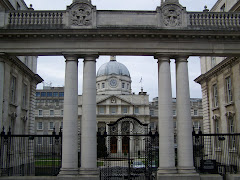Reidski has already mentioned a great book called 'Cod' and about cod, by Mark Kurlansky. I have just finished this book and it is amazing, showing how it can be argued that this one fish shaped the development of the western world as pursuit of the cod led to the discovery of America,and then to the economic strength of New England which in turn saw the independence of the United States. All because of one little fish - except 500 years ago they were not little fish and could grow up to six feet long and live into their 30's with the females laying millions of eggs every year.
He then goes on to show how over fishing of the fish which were so numerous in the North Atlantic some said you could walk right across the sea using their backs as stepping stones, has practically eradicted the cod in many seas.
In Hull in 1975 there were 250 fish warehouses selling cod across Europe. A year later after the last Cod War with Iceland there were 80 such warehouses, and the following year when I arrived in Hull most of those had closed too. No wonder I arrived in a dying city.
As an aside, in Hull knowing the cod as well as they do they only eat haddock, calling cod a dirty fish that lives on the bottom of the ocean and eats all the rubbish that accumulates there.
Kurlansky talks to fishermen - actually, mainly to former fishermen - some of whom accept the cod will never return to their waters, but some who are convinced a few years with a fishing ban will lead to the recovery of stocks.
Kurlansky notes that to forecast the recovery of the cod population is to gamble: "There is only one known calculation: 'When you get to zero, it will produce zero.'"
We have extinguished many species on land and although it has to be more difficult to extinguish species in the ocean according to this book we have pretty much managed that too.
Dogfish and chip supper anyone?
Reflections
-
At Dale Dyke Reservoir on Saturday, the surface of the water was unusually
still. This, along with the sharpness of the light, ensured that any
reflectio...
12 hours ago






6 comments:
If you liked that one Jane try Kurlansky's other book "A Basque History of the World". Its a great read and a really good introduction to one of the most facsinating peoples of Europe.
It's sad that even though we are fising the seas empty, we see less and less fresh fish. It's all processed, and what's for sale is very expensive.
"a dying city" - Hull? Balderdash and poppycock my dear! Try "Nirvana" instead!
And if Hull was a dying city what the hell was Northampton - a desolate ghost town that's what!
Only jesting...you are of course right - the end of the fishing industry was almost a fatal blow to Hull and some of that depression still hangs about the place now.
The book sounds fascinating. I will look out for it. There's still "The Silver Cod" on Anlaby "Road"! Or should I say "rooard" (Hull accent)?
Excellent post on a great book. As an aside (and this is so far off the point) in my previous life as a journalist, we had a colleague who insisted on using the term "fishing folk" instead of "fishermen" even though it was pointed out to her that there were, in fact, no women at all working on fishing boats in Britain at the time. Stupid woman that she was!
I've never felt so informed by any other blog post anywhere. Most excellent.
Kev, I really liked the bit in this book where he explains how the Basques were bringing huge quanties of cod back from no one knew where - in fact they had been going to America well before Columbus, but didn't want to make a big deal about having discovered America because they just wanted to keep the fishing to themselves.
Brom, there is also a section in the book of factory fish farming and how that harms the wild stocks...scary stuff.
YP - book is highly recommended.I know Hull city centre looks good now, but it is a shame the marinas are all gentrified and are no longer needed for the fishing industry.
Reidski, I can't stop laughing at 'fisher folk!'
Thanks Jim! *blushing*.
Post a Comment